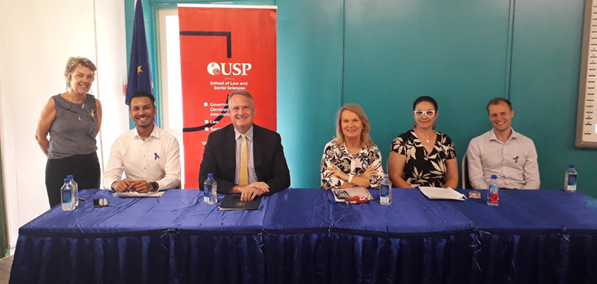Related News

From left: Associate Professor Dr Sandra Tarte, Aneet Kumar, Antone Greubel, Dr Erja Askola, Dr Sarina Theys and Isaac Greenwood. Picture Zifirah Vunileba/Wansolwara
By ZIFIRAH VUNILEBA
RUSSIA’S invasion of Ukraine has inevitably affected the rest of the world, including Pacific Island countries such as Fiji that rely heavily on larger economies and countries for trade of goods and services.
The invasion caused a rippling effect from severing diplomatic relations and territorial integrity. Other effects include inflation, global food security, disruption of the supply chain in various key markets, according to acting head of Delegation of the European Union (EU) for the Pacific, Dr Erja Askol.
During a special panel discussion at The University of the South Pacific’s Laucala campus this year to reflect on Russia’s invasion of Ukraine a year ago to reclaim territory and authority, Dr Askol said Ukraine had been a target of unprovoked and unjustified attack by a nuclear power.
“It undermines any respect of territorial integrity and sovereignty,” Dr Erja said.
She said Ukraine had recently joined the EU to help promote better trade agreements and that the EU supplied weapons for Ukraine to defend itself.
US Embassy deputy chief of mission Antone Greubel, who was also a panelist, said the US and other major countries supported Ukraine in the conflict.
“The United States, the European Union, United Kingdom, Australia, New Zealand and Pacific Island countries, all these other partners, did not hesitate to stand with the people of Ukraine. Russia and Russia alone can end this war today,” Mr Greubel said.
USP’s Acting head of School of Law and Social Sciences (SoLaSS) Associate Professor Dr Sandra Tarte moderated the discussions, and added the Russia-Ukraine war displaced more than 13 million people.
“The people of Ukraine have since suffered the brunt; their lives and their country will never be the same,” she said.
The panel also included USP lecturer in diplomacy and international affairs Dr Sarina Theys, British High Commission political officer Isaac Greenwood and USP masters student Aneet Kumar.
In April this year, the EU said it aimed to strengthen its partnerships around the world, based on political and economic engagement and mutual co-operation, given the fragmented geopolitical context, and with Russia’s war against Ukraine spreading instability all around the world.
Josep Borrell, the EU’s high representative for foreign affairs and security policy, said the EU and its member states had already facilitated the delivery of more than €13 billion ($F31.3b) in military support.
“We all want peace, first and foremost the Ukrainians. But it needs to be a just peace. Until then, we will continue supporting Ukraine’s defence.
“Recently, some ideas regarding peace were floated by China, and also Brazil. For credible, honest peace efforts one needs to also talk to Kyiv and go there to see the aggression through the eyes of those who are being bombed,” Mr Borrell said.